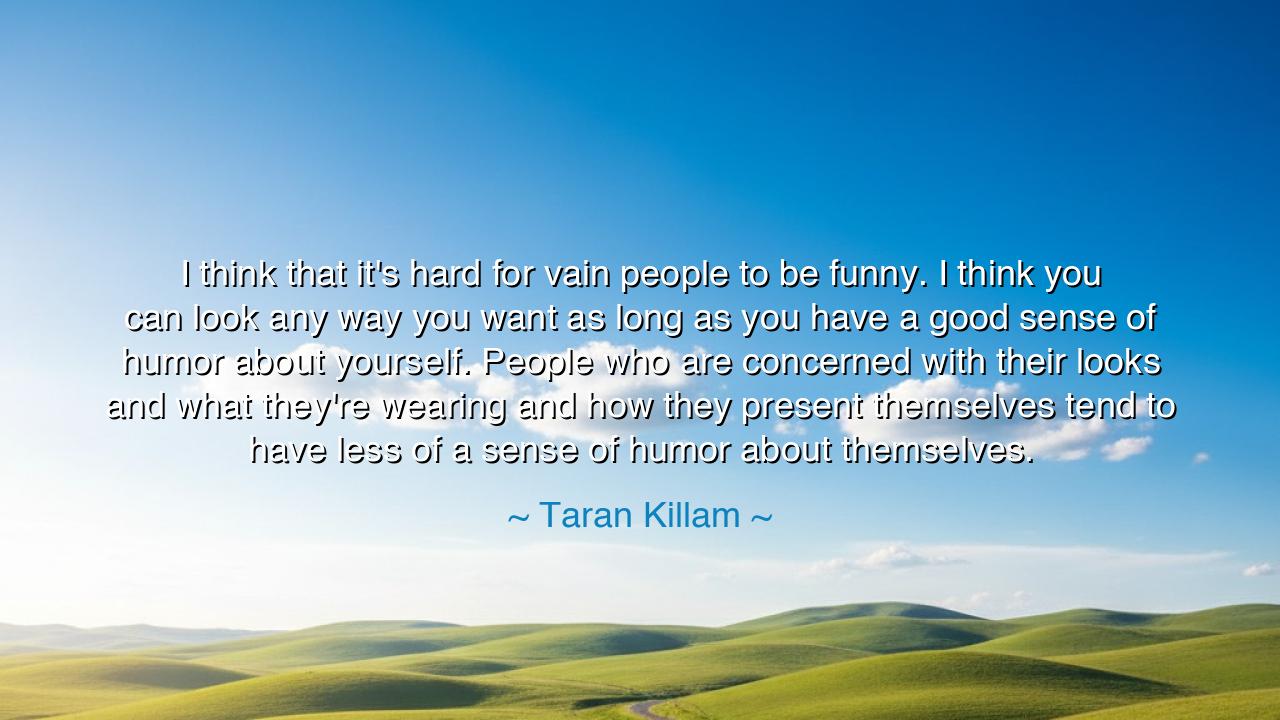
I think that it's hard for vain people to be funny. I think you
I think that it's hard for vain people to be funny. I think you can look any way you want as long as you have a good sense of humor about yourself. People who are concerned with their looks and what they're wearing and how they present themselves tend to have less of a sense of humor about themselves.






"I think that it's hard for vain people to be funny. I think you can look any way you want as long as you have a good sense of humor about yourself. People who are concerned with their looks and what they're wearing and how they present themselves tend to have less of a sense of humor about themselves." These words from Taran Killam contain a profound truth about the essence of humor and self-acceptance. To be truly funny, one must be able to laugh at themselves, to step outside the constraints of ego and vanity, and embrace the imperfections that make us human. The essence of humor lies not in perfection or in how one is perceived, but in the ability to embrace one's flaws and vulnerabilities with grace and laughter. Vanity—with its focus on external image—creates a barrier to this self-acceptance, making it difficult to view life, or oneself, with the lightness and humor that is necessary for true comedic connection.
In the ancient world, the great philosophers often spoke of the dangers of pride and vanity, which clouded the judgment of even the most gifted individuals. Socrates famously rejected wealth and status, knowing that these external markers could easily lead to a loss of self-awareness. He believed that wisdom was found not in outward appearance or societal status but in the humility of recognizing one’s own flaws and limitations. To possess the virtue of wisdom, Socrates argued, one must be free from the shackles of vanity—for vanity prevents us from seeing our true selves. In much the same way, Killam’s words point to the fact that humor arises not from how we appear to others, but from the inner freedom to laugh at our imperfections and not take ourselves too seriously.
Consider the example of Diogenes, the ancient philosopher who lived in a barrel, rejecting all pretense of luxury, and often mocking the vanity of the rich and powerful. Diogenes was known for his unflinching honesty and self-deprecating humor—he could laugh at his own situation because he was free from the concern of how he was perceived. His refusal to conform to society’s expectations, and his ability to make light of his own poverty and eccentricities, is a testament to the power of humility in cultivating humor. In Diogenes, we see the embodiment of Killam's observation: those who are concerned with appearances and external validation are less likely to embrace humor as a way of understanding their place in the world.
The story of Cicero, the Roman statesman, also illustrates this dynamic. Cicero, though highly regarded for his oratory skills, often used humor in his speeches to deflate the egos of his political rivals. His wit, while sharp and incisive, was never born out of vanity. Instead, it was grounded in self-awareness and the understanding that true power lies not in the need for admiration, but in the ability to see the world—and oneself—with a sense of humor. Cicero was able to laugh at the absurdities of politics, the excesses of the Roman elite, and even his own shortcomings, because he was not trapped in the pursuit of superficial validation. Humor, in this sense, became a weapon against pride, allowing him to remain both effective and genuine in the eyes of the people.
In more recent times, figures like Charlie Chaplin embodied the power of humor to transcend vanity and external appearance. Chaplin, despite his iconic mustache and scruffy attire, became one of the greatest comedians in history, not because of his looks, but because of his self-awareness. His character, the Tramp, was far from perfect—he was awkward, dirty, and always facing hardship. Yet, it was in these imperfections that Chaplin found his greatest humor. His ability to laugh at the world and at himself created a universal connection with audiences. Chaplin, like Killam’s ideal, understood that humor is not born from external perfection, but from an honest, self-deprecating view of the world and one’s own place in it.
The core lesson in Killam's words is not just about humor, but about self-acceptance and the freedom that comes from shedding the weight of vanity and ego. To be truly funny, to engage in the kind of humor that resonates deeply with others, one must embrace imperfection and vulnerability. It is through the willingness to laugh at ourselves, to make light of our failures and mistakes, that we open the door to authentic connections with others. Those who are constantly consumed by their appearance, by how they are perceived, miss out on this freedom. They cannot laugh at themselves because they are too invested in maintaining a facade of perfection.
So, dear listener, take this wisdom to heart. Release yourself from the chains of vanity and perfectionism. Laugh at your imperfections; allow humor to come from the space of self-awareness, not self-obsession. The next time you feel the pressure to be flawless or to maintain a certain image, remember that true humor and connection come from the willingness to embrace the messy, unpolished parts of yourself. Like Diogenes, like Chaplin, and like Socrates, cultivate a sense of humor that is not built on appearances but on humility and authenticity. In doing so, you will discover that the greatest humor is born from honesty, and it is in accepting our flaws that we find true freedom—freedom to laugh, to live, and to connect deeply with others.






AAdministratorAdministrator
Welcome, honored guests. Please leave a comment, we will respond soon